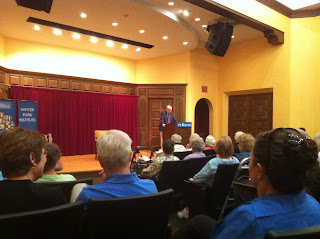This blog is a digital forum to discuss the link between history and the people, events, and ideas shaping our world.
Monday, March 14, 2011
History and Civil Rights
Julian Bond's recent visit to Rollins College was a unique opportunity to interact with someone with long history linked to the struggle for civil rights in the United States. As the person who nominated Mr. Bond to Winter Park Institute, I was asked to introduce him at events. It would have been an honored but, I demurred in part because there are many people on campus with their own history of striving for civil rights that would be better choices. Of course, Barry Levis my colleague in the History department at Rollins was high on my list.
Barry Levis came to Rollins College in 1968 as a professor of history. For more than forty years Levis has served the college as an active faculty member, student mentor and champion of academic excellence. Levis, like Julian Bond, hails from Pennsylvania. He grew up in Philadelphia like Bond, and went on to study at Pennsylvania State University, where he received his bachelor’s, M.A., and his Ph.D. in history. Since coming to Rollins Barry Levis embraced his own identity as gay man and emerged as an advocate for LGBTQ faculty and student. His efforts, along with other faculty, are reason that Rollins has domestic partner rights. Moreover, Barry has served as an advocate for diversity in curriculum, the faculty, and for the student body. I think my presence here is in part a result of that commitment.
I know this is something he regrets deeply, but it is too late:-)
So it was extremely fitting that Barry Levis gave a perfect introduction to Julian Bond on March 3, 2011. Mr. Bond talk detailed how he became involved in the struggle for civil rights in the United States. Barry Levis' introduction touched on the many points of overlap between the two men, but perhaps knowing Dr. Levis own efforts, his introduction is perhaps more meaningful for you.
My name is Barry Levis, Professor of History. When growing up in suburban Philadelphia in the 50s, I was vaguely aware of the great clashes of the Civil Rights movement. But, after all, it was taking place in another country south of the Mason-Dixon line where people spoke strange non-northern dialects of English. Frankly, I didn’t pay much attention. I was away at college when the race riots broke out in Philadelphia in 1964, and again only dimly paid attention. Returning from college in 1965, however, I did take notice since it had come rather closer to home. My father was ranting at the Philadelphia Evening Bulletin, which he often did, because our Episcopal Bishop, Robert Dewitt, had engaged in marches around Girard College trying to de-segregate it. Stephen Girard had founded the college for fatherless white boys, and Bishop Dewitt among others tried to get the court to break the will since by now a large portion of the city was African-American. My father, an equal opportunity bigot [unless you were a white Protestant Republican who drove a GM car, you were somehow subhuman], was infuriated that the bishop had marched in full Episcopal regalia around the school. So this sort of discrimination thing was not just something that happened in the South. I also learned about the same time that my high school in Abington had before Brown vs. Board of Education actually had two campuses: the main one offering college preparatory courses and another in Crestmont, where our maid lived, the vocational program. That year proved a turning point in my life as I drifted away from what I had been taught at home to become what my father claimed was a communist.
While I was still living in my suburban haze, however, Julian Bond—a fellow Pennsylvania, I’m proud to say—had already become renowned as a student civil rights activist and leader. He moved to Pennsylvania in 1945 when he father became president of Lincoln University, near Kennett Square. He attended the George School just up the pike from Abington in Bucks Country and then attended Morehouse College in Atlanta, George. But unlike me, he did not remain political passive; he quickly became a student leader in both the civil rights movement and the anti-Vietnam War movement. In 1960, he founded the Committee on Appeal for Human Rights, a group instrumental in desegregating Atlanta’s theatres and parks. That same year, he helped organize SNCC (The Student Non-violent Coordinating Committee). By 1964 he had been elected but expelled from his seat not once but twice in the George State Legislature because of his stance on the War in Vietnam. He subsequently served four terms in the State House and six terms in the State senate. He was nominated to run as Vice President in the 1968 Democratic election, although he turned it down because of his age. In 1971 he became involved with the Southern Poverty Law Center and served as its president from 1971 to 1979. Subsequently, he served as Chairman of NAACP from 1998 to 2009. He has held teaching position at Penn, Harvard, UVA, Drexel, and Williams. And he even has time to write poetry!
I have always been an admirer of Mr. Bond because he consistently speaks in measured tones, but his message is at all times inspiring and uncompromising. Although we are now three days from the end of Black History Month, it is still not too late to look back at those events, in which Mr. Bond was so intimately connected. As he told an Orlando Sentinel reporter, “It seems to me a proper time to celebrate the achievements and struggles of African-Americans. Even today, those struggles continue.”
It is my distinct pleasure to introduce Julian Bond to talk about that history.
Thank You Dr. Levis....
Subscribe to:
Comments (Atom)
